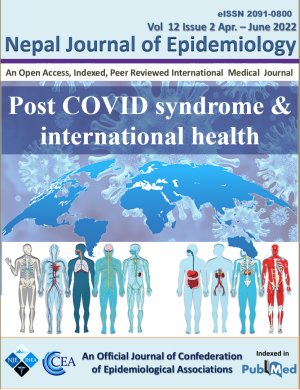A survey of Post-Traumatic Stress Disorder, Anxiety and Depression among Flood Affected Populations in Kerala, India
DOI:
https://doi.org/10.3126/nje.v12i2.46334Keywords:
Flood, Post-Traumatic Stress Disorder, Anxiety, DepressionAbstract
Background: Globally, post traumatic stress disorder (PTSD) is one of the most common psychiatric illnesses following a disaster. We aimed to evaluate the relationship between the socio-economic and flood exposure factors with PTSD, depression and anxiety among the flood-affected populations in Kerala, India.
Methods: A cross-sectional household survey was conducted from November 2019 to January 2020 in Kozhikode district of Kerala, India. Adults (≥ 18 years), who were permanent residents and had been directly exposed to the flood, were invited to take part in the study. Individuals with a history of mental health issues and those who had other stressful situations in the past were excluded. The survey questionnaire was based on three screening tools: (1) PTSD Checklist for DSM-5 (PCL-5); (2) patient health questionnaire (PHQ-9); and (3) generalized anxiety disorder (GAD-7). Data included sociodemographic factors and flood exposure variables. The primary outcome variable was psychiatric morbidity (PTSD, anxiety and depression).
Results: A total of 276 respondents (150 males/126 females) participated in the study. A significant correlation was observed between total score on PCL-5 and GAD-7 (r=0.339, p=0.001) and PHQ-9 (r=0.262, p=0.001). Females had significantly higher total PTSD symptom severity scores (8.24±5.88 vs. 6.07±5.22; p=0.001), severity of symptoms of intrusion (4.66±3.60 vs. 3.69±3.20; p=0.04), increased level of anxiety (2.54±1.94 vs. 1.79±1.53; p=0.001) and depression (3.02±2.26 vs. 2.04±1.67; p=0.001) compared to males. However, the gender difference for PTSD symptoms disappeared when controlling for age.
Conclusion: The findings of this survey revealed that the vast majority of respondents (92 percent females and 87 percent males) still had subclinical psychiatric symptoms one year after the flood. Therefore, tailored psychological interventions are warranted to counter the long-lasting impact of flooding on the mental health of individuals.
Downloads
Downloads
Published
How to Cite
Issue
Section
License
Copyright (c) 2022 CEA & INEA

This work is licensed under a Creative Commons Attribution 4.0 International License.
- Upon acceptance Copyright on any research article is transferred in full to the Confederation of Epidemiological Associations (CEA) and International Nepal Epidemiological Association (INEA). The copyright transfer includes the right to reproduce and distribute the article in any form of reproduction (printing, electronic media or any other form).
- Articles in the Nepal Journal of Epidemiology are Open Access articles published under the Creative Commons CC BY License (https://creativecommons.org/licenses/by/4.0/)
- This license permits use, distribution and reproduction in any medium, provided the original work is properly cited.




